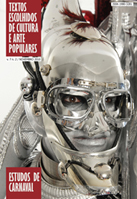SOLTANDO O VERBO: RATOS E URUBUS, DIRETAMENTE O POVO ESCOLHIA O PRESIDENTE!
DOI:
https://doi.org/10.12957/tecap.2010.12029Palavras-chave:
SAMBAS DE ENREDO, CARNAVAL, ESCOLA DE SAMBA, POLÍTICA BRASILEIRA, REDEMOCRATIZAÇÃO.Resumo
DOI: http://dx.doi.org/10.12957/tecap.2010.12029
O desfile das escolas de samba do Rio de Janeiro é uma festa que exemplifica aquilo que Marcel Mauss denominou “fato social total”, já que aí se exprimem de modo entrelaçado as instituições econômicas, jurídicas, religiosas, morais, políticas, além de fenômenos estéticos e morfológicos. Em sua dimensão simbólica, o desfile se serve de uma infinidade de linguagens que estabelecem a comunicação entre os atores sociais implicados, posto que, como exara Ernst Cassirer, a linguagem é fenômeno fundante do homem como ser simbólico e social. Nota-se no desfile o recurso a linguagens não verbais, como a sonoridade instrumental, a dança, os gestos, a indumentária e os elementos alegóricos, bem como a linguagens verbais expressas nas sinopses dos enredos e nos sambas a partir daí compostos. Neste trabalho, exploramos o modo como o desfile de escola de samba – enquanto fato social total e, por isso, instaurador de ampla rede que mobiliza simultaneamente diversas instâncias institucionais – acompanhou o movimento de redemocratização brasileira, nos anos 80, manifestando em seus sambas de enredo os anseios da sociedade.
Downloads
Publicado
Como Citar
Edição
Seção
Licença
Autores que publicam nesta revista concordam com os seguintes termos:- Autores mantém os direitos autorais e concedem à revista o direito de primeira publicação, com o trabalho simultaneamente licenciado sob a Licença Creative Commons Attribution que permite o compartilhamento do trabalho com reconhecimento da autoria e publicação inicial nesta revista.
- Autores têm autorização para assumir contratos adicionais separadamente, para distribuição não-exclusiva da versão do trabalho publicada nesta revista (ex.: publicar em repositório institucional ou como capítulo de livro), com reconhecimento de autoria e publicação inicial nesta revista.
- Autores têm permissão e são estimulados a publicar e distribuir seu trabalho online (ex.: em repositórios institucionais ou na sua página pessoal) a qualquer ponto antes ou durante o processo editorial, já que isso pode gerar alterações produtivas, bem como aumentar o impacto e a citação do trabalho publicado (Veja O Efeito do Acesso Livre).

